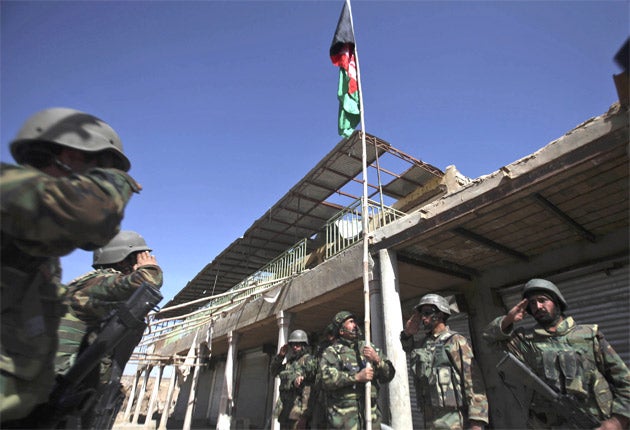Afghan troops raise flag in key town but Marjah battle not over yet
Reports of talks between Karzai officials and Taliban militants in the Maldives

Afghan soldiers capped five days of heavy fighting yesterday by raising their national flag over a badly damaged bazaar in Marjah, deep in southern Afghanistan, after driving back tenacious Taliban snipers on their third attempt.
Amid blasted shops and deserted stalls, a soldier ran up the red, green and black tricolour, shouting "Allahu Akbar" as the top Afghan general in Helmand and the provincial governor looked on. Planning to capitalise on the symbolism of the flag-raising, the Afghan authorities and their Nato allies say they intend to install Marjah sub-district governor Haji Zahir in his office abutting the market "in the next couple of days", once the building has been cleared of booby traps.
A government-in-waiting backed by hundreds of Western advisers – including Britons, Americans and Danes – and Afghan officials is said to be ready to start providing security and basic services, including electricity, schools and clinics, as soon as US Marines and their Afghan counterparts can guarantee their safety.
One of the first development projects designed to improve commerce and provide jobs will be construction of a paved road linking Marjah to the town of Garmsir, the rest of Helmand province and beyond.
Stabilisation experts say 2,000 specially trained Afghan police are on standby to help maintain security once combat operations end. Whether they prove to be any less corrupt and incompetent than regular police is one of the biggest question marks hanging over the long-term prospects of Operation Moshtarak.
A top US official claimed that the Afghan government had received its first approaches from militants in Marjah seeking amnesty which, if substantiated, would be a sizeable coup in the battle of perceptions accompanying the smoke and gunfire.
During a fleeting visit to the Afghan capital Kabul, US envoy Richard Holbrooke said: "We're already getting the noises, the feelers, but I'm going to leave the details which are necessarily classified."
There were reports that Afghan government officials had met Taliban representatives in the Maldives at the end of January. Citing a spokesman for the President of the Indian Ocean nation, the Associated Press said the talks had lasted three days. Coupled with the claim by the outgoing UN envoy to Afghanistan, Kai Eide, that he had met Taliban representatives in Dubai at the same time, the Maldives report seemed to give credence to rumours that the Afghan government is indeed negotiating with the militants. The US has been careful to keep its distance, preferring any peace talks to proceed autonomously and at the discretion of the Afghan government, with Pakistan and Saudi Arabia both vying to broker any deal.
Mr Holbrooke warned, however, that there was little likelihood of a single agreement bringing an end to all hostilities between President Hamid Karzai's government and the bewildering number of insurgent factions at war with it. "This war is not going to end at an airbase," he said, referring to the deal he brokered at Dayton, Ohio, to end the Bosnian War.
Asked about the capture of the Taliban number two Mullah Abdul Ghani Baradar by Pakistan and US operatives, Mr Holbrooke called the raid a "significant development" and an indication of the "deepening co-operation" between the US and Pakistan, but refused to be drawn further.
Nato and its Afghan allies are still running into pockets of stiff resistance in Marjah and conditions are grim for civilians, with one local resident telling French news agency AFP that "people have come out of their homes and into a desert, without any food or water".
General Moheedin Ghori, commander of the 4,400 Afghan troops taking part, claimed that the Taliban were using human shields, knowing that the allies' rules of engagement prevent them from targeting insurgents when there is a risk of collateral damage. The Taliban promptly denied the report.
In a separate indication of how emotive the issue of civilian casualties has become in Afghanistan, Amnesty International slammed Nato for failing to have a "credible mechanism" for investigating civilian deaths after conflicting reports of how 12 Afghans, at least nine of them bystanders, were killed in a rocket strike on Sunday.
Subscribe to Independent Premium to bookmark this article
Want to bookmark your favourite articles and stories to read or reference later? Start your Independent Premium subscription today.

Join our commenting forum
Join thought-provoking conversations, follow other Independent readers and see their replies